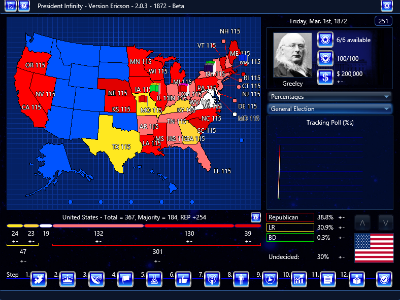Version 2.0 by OS Davis included events, a few new issues, and two new minor parties: Equal Rights and Prohibition.
Version 3.0 was updated by the Historical Scenario Commission on July 27, 2017. Download here: United States – 1872 v. 3.0
*****
The 1872 election is one of the most bizarre elections in our history. President Grant’s first term was highly controversial, involving scandals and Radical Republican Reconstruction legislation. The corruption of the administration bothered both Democrats and Republicans. However, Grant was still personally popular, as he was perceived to have been mostly beyond the scandals of his administration. As such, a disorganized Democratic Party, weakened by Reconstruction, united with unhappy, reform-minded Republicans in strengthening a new party–the Liberal Republican Party.
For the Republican, Grant and his backers had such a strong hold on that party, that he was unchallenged for the nomination, despite the controversial first term.
The Liberal Republicans field many interesting candidates, but none as powerful a figure as President Grant. The leading candidates were:eccentric newspaper editor, Horace Greeley, and former ambassador, and son of president John Quincy Adams and grandson of president John Adams, Charles Francis Adams, who had kept the British from aiding the Confederacy during the Civil War. Other candidates include popular Missouri politician Benjamin Gratz Brown, well-known civil right activist Lyman Trumbull, Supreme Court Judge David Davis, Chief Justice of the Supreme Court Salmon P. Chase and ambassador Andrew Curtin.
The Bourbon Democrats is the third part for this election. They were conservative, pro-business Democrats that would not endorse the Liberal Republicans. The candidates selected were Charles O’Conor and John Quincy Adams II, the son of the ambassador mentioned above. Both candidates refused to join this third party, but they were on the ballots anyway.
This election has many what-if scenarios:
- What if several Republicans ganged up on Ulysses S. Grant and his corrupt political machine and fielded several candidates from many states in order to hold as many delegates as possible, so that they could choose a reform candidate? These candidates include Rutherford B. Hayes, James G. Blaine, Charles Sumner, John Sherman, Benjamin F. Butler, John C. Fremont, Ambrose Burnside and many others.
- What if the Democrats had been better organized, more confident and fielded their own candidates like a usual election? Candidates for the Democrats include Thomas A. Hendricks, Winfield Scott Hancock, Samuel J. Tilden, John Quincy Adams II, Thomas Bayard, Salmon P. Chase, George B. McClellan, Horatio Seymour, former president Andrew Johnson, former Whig president Millard Fillmore and many others.
- What if Samuel J. Tilden ran as the Bourbon Democrat nominee?
For the best effect, it is best that you turn off the Liberal Republicans and the Bourbon Democrats, if you turn the Democrats ON. However, the game is still highly playable if you play as every party. However, keep in mind that some politicians belong to more than one party in this scenario.
Feedback is desired.

